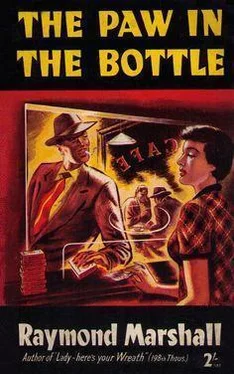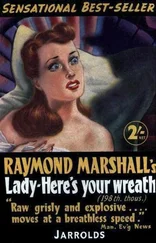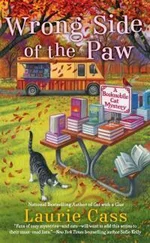Before being remanded for a week he heard Detective Inspector Dawson admit ruefully that Mrs. French and her daughter had slipped through his fingers and were so far still at liberty. He heard the news with mixed feelings; relief and envy. Had he glanced round the court he would have had Dawson’s statement confirmed, for Dana was sitting only a few yards from him. It would have considerably cheered him to know that she had risked coming to the court to see him. He felt deserted, experiencing a frustrated rage to think that Theo had escaped all this by death.
Dana wasn’t particularly worried about herself. She knew the risk wasn’t great. The police had no detailed description of her; she was not known to them, and she had taken the precaution to wear a pair of shell spectacles and to tuck her auburn hair out of sight under a close-fitting little hat.
She thought Harry looked ghastly. He was obviously ill at ease and frightened and she scarcely recognized him. To see the way he gripped the dock rail until his knuckles turned white and to hear his quavering voice when he asked for legal aid sent a pang through her heart; for Dana had been in love with Harry for a long time.
The magistrate seemed to be in a hurry to get rid of Harry. When Dawson asked for a remand he agreed with alacrity. Dawson said he hoped by the end of the week to have made further arrests. As Harry turned to leave the dock he caught sight of Dana who smiled cheerfully at him. He was staggered to see her there, and as the police urged him away he gave her a frightened, haunted look that worried her.
‘He’s in a bad way,’ she thought, as she pushed through the crowd to the street. ‘But they can’t hang him. He didn’t do it. Theo must have done it. He had the gun. I’ve got to get Harry out of this mess somehow — but how?’
She wandered along the street deep in thought, but knowing at the back of her mind that there was nothing she could do for him. They had got him. Once they got their claws in you, you were finished.
While she was wrestling with her problem, Inspector Dawson arrived back at his office to find Garson waiting for him.
‘Remanded for a week,’ he said, in answer to Garson’s query. ‘We’ll have to catch ’em by then.’ He sat down at his desk. ‘Any news?’
‘Not of Ma French and Dana. They’ve hidden up some-where pretty snug. No sign of them.’
Dawson grunted.
‘What about the taxi driver who took Mrs. Wesley from the theatre to her flat? Found him?’
‘It doesn’t look as if she went by taxi. No driver’s come forward. And another thing, no driver’s come forward about taking Wesley home. That’s a bit odd, sir. A driver’s not likely to forget a blind man.’
‘Wesley said he came back by taxi, didn’t he?’
‘Yes, sir. I have his statement here.’
‘Leave that for a moment. Find out anything about Mrs. Wesley’s movements?’
‘Not a great deal, sir. The commissionaire at the theatre saw her get out of the taxi and enter the theatre while Wesley was paying the fare. She’s well known at the theatre, of course. She’s played there a number of times. She went to the bar. The commissionaire thought it was strange she should leave Wesley to find his way in. He showed Wesley to the entrance of the stalls and told him Mrs. Wesley was in the bar. He says Wesley didn’t appear to hear, but went down the gangway, where a programme seller took charge of him.’
‘I don’t see why he shouldn’t have heard. He’s not deaf. Well, go on.’
‘Mrs. Wesley went to the bar. The bartender said she seemed in a bad temper and scarcely spoke to her. The woman was disappointed as she looked on Mrs. Wesley’s visits as a bit of an occasion. She said Mrs. Wesley drank three brandies and a minute or so before the first bell rang, left the bar. The commissionaire was surprised to see her leave the theatre. She headed towards Piccadilly Circus and no one seems to have seen her again until she arrived at the flat.’
‘She could have taken the underground. Taxis aren’t easy to get these days.’
‘I think that’s what happened, sir. If she caught a train at once she would have arrived about the time she did.’
‘Let’s get back to Wesley. How does his statement compare to the actual facts?’
‘All right, sir, with two exceptions. One was the commissionaire told him Mrs. Wesley was in the bar and he says he didn’t know where she was. But then, of course, he might not have heard the man. But when he came out of the theatre after the curtain had gone up, the commissionaire offered to get him a taxi, and he refused. That seems a bit odd to me, sir. I have his statement here. He says, “It occurred to me that she might have returned here and I became alarmed. I had some difficulty in stopping a taxi. At last someone took pity on me and stopped one for me.” ’
‘Yes, very odd. If the commissionaire offered to get him a taxi and he was alarmed, why didn’t he let the man get him one? Why go blundering about the street? He surely would know he couldn’t hope to get a cab for himself. I think I’ll have another word with him about that. He’s not living at Park Way any longer. He’s moved into a flat in Vigo Street. He’s living with that Holland girl.’
Garson showed his surprise.
‘That’s something that foxes me, Garson.’ Dawson pushed back his chair, thrust his knee against his desk. ‘What’s the idea of a fellow like Wesley living with that Holland girl?’
Garson grinned.
‘She’s a pretty nice-looking girl, sir. A fellow doesn’t worry too much about what’s inside a girl’s head these days so long as she’s got a good body and a pretty face. At least, not the fellows who want that kind of fun.’
‘What’s a pretty face to a blind man?’
Garson blinked.
‘Yes, of course. I wasn’t thinking. No, you’re right, sir. I wonder what the idea is?’
‘I’ve had a man keeping an eye on them. Wesley’s throwing money away on her. They’re going everywhere: night clubs, theatres, bottle parties, dances, restaurants, even riding in the Row. He’s not going to the factory any more. For the past four days they’ve been everywhere together. I want to know what the idea is.’
‘Blackmail?’
‘I don’t think so. If it were blackmail why should she go around with him? A blackmailer likes to keep at a safe distance. And she doesn’t strike me as the type.’
‘Perhaps they’re in love, sir.’
‘Perhaps they are. I don’t know. All right, Garson, you concentrate on the Frenches. I want ’em quickly. They’re holed up somewhere. Keep after them. I’ll have a word with Wesley. And keep after those taxi drivers. There’s still a chance one or both’ll come forward.’
When Garson had gone, Dawson glanced at his watch. It was a few minutes after three o’clock. He’d call on Wesley about five, he told himself. If Wesley wasn’t in, he might get a chance to talk to Julie Holland.
Benton lived alone in a small but comfortable West End flat on the top floor of an old-fashioned building that contained three bachelor flats and was serviced by a housekeeper and a valet. Breakfast was the only meal provided, and this was served in the small alcove leading off Benton’s sitting-room.
At eight o’clock each morning (nine o’clock on Sundays), the meal was set on the table. Benton rose at seven-thirty, bathed and shaved, and then, in pyjamas and dressing gown, had breakfast. He left the flat at nine o’clock for the factory.
His breakfast consisted of cornflakes with watered milk, toast, a scraping of butter and strong coffee: it never varied. When he had finished the meal, he lit a cigarette and unfolded the newspaper that lay in a tight roll on the tray. No matter how important the news, he didn’t look at the paper until he moved from the table and sat in an arm-chair.
Читать дальше











